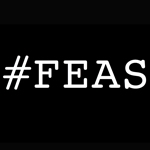Karen Nociti, Edith Cowan University
Karen took part in an ethical citational practices workshop that Mindy, Emily and Linda ran at Edith Cowan University in WA. Following the workshop, we gathered together to make the first #FEAS zine – the photographs that accompany this blog are of our collective zine making.
As a research student and teacher educator I am relatively new to the world of academia. I can see how it easy it could be to immerse yourself in your work without stopping to notice and acknowledge the voices that dominate in higher education and the academy in general. The concept of noticing was brought to my attention during a recent workshop that was facilitated by #FEAS founding members Dr Emily Gray (RMIT), Associate Professor Linda Knight (RMIT) and Professor Mindy Blaise (ECU). The workshop was designed to draw attention to citational politics, ethics and practices and to ultimately arm participants with the impetus and skills to challenge long standing practices that exist in academia.
Prior to my entry into academia, I certainly noticed sexism, racism and to some degree ageism within the education system in which I worked as an early childhood teacher. These ‘isms’ are explicit in the resounding presence of white male voices that have always dominated the Western education system but also implicit in the silencing of the voices of Aboriginal and Torres Strait Islander perspectives and of women in general. It follows that this system is ultimately influenced by the dominant voices in the academy and it was no surprise to discover similar trends within academia. What I had failed to notice is how far reaching these seemingly fixed features of the system are in their impact on minority groups. #FEAS has been instrumental in drawing my attention to the wide-reaching consequences of sexism (and all of the other ‘isms’) within academia and perhaps most importantly, has forced me to notice my own unconscious (and unintentional) contribution to the status quo.
During the aforementioned workshop, participants were invited to conduct an internet search to find out the dominant voices within our own discipline. It was emphasised that who is not there is equally important as noticing who is. I dutifully began the task and was not surprised to find little, if any, voices of Aboriginal peoples that are cited frequently in high quality education journals. White males dominated the findings as my colleague and I searched with hope for the women scholars that we had expected to be there. As we continued on with the task my conscience tapped me on the shoulder and pointed out a list of references that I needed to check. One of my roles as a teacher educator is to sort through current educational research and select the unit readings that my students will be expected to engage with throughout a given unit. I pulled out a recent reading guide that I had prepared and started to scan for those typically less heard voices. I could not find a single one; most of the readings were written by white males, with very few woman scholars included in the list. This finding leads me to the essential practice that partners with noticing: acting on it. Having noticed a serious shortcoming in my reading list, it is my ethical responsibility to act on it; I have power to challenge the status quo and be an active contributor to change.
The #FEAS workshop outlined a suite of six practices that enable the implementation of ethical citation practices. They begin with ethical reviewing as we reflect on whose work we recommend to others. Ethical writing practices follow and can be practiced through acts such as using full names in citations. Noticing (and acting on it), ethical supervisory practices, ethical reading and ethical teaching complete the suite. This suite of practices formed the basis for an additional complementary workshop that followed on from the first but with the focus this time on the development and creation of the first issue in a series of zines. The purpose of the zine in this context is as a form of activism designed to prompt others to notice their own citational practices and then in turn take action. The zine-making workshop gave way to rich discussion, reflection and generative arts practice as we worked together to create the first issue. For me personally, it highlighted the essentiality of the role that we all play contributing to change. The zines will make explicit the important work that #FEAS do to challenge the ‘isms’ in education. They will be distributed at future pop-up events and will be sent to Deputy Vice Chancellors of research across all Australian universities.
With the suite of ethical citational practices now at the forefront of my mind, I am currently in the process of collating a reading list of references written by Aboriginal scholars. These will then be distributed to my colleagues for their consideration when planning unit reading materials for students. It is one action that I am making in response to noticing the voices missing from my unit materials. I recently met an Aboriginal woman academic at a university event and spoke with her about the challenge of this one small task. Her response was that she only wished that when she was studying she had seen Aboriginal scholars on her reading lists. She was certain that this seemingly small act could have a profound impact on the aspirations of Aboriginal students in higher education. If the goal of the workshop was to create awareness for change then it certainly achieved this for me.



